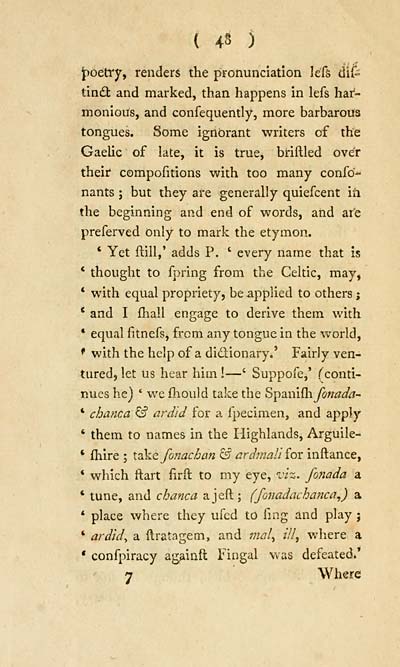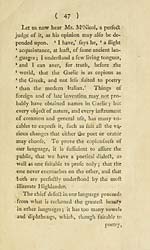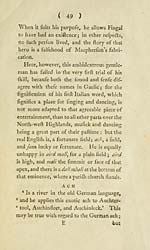Ossian Collection > Defence of the Scots Highlanders, in general; and some learned characters, in particular
(58)
Download files
Complete book:
Individual page:
Thumbnail gallery: Grid view | List view

( 48 )
J)oetrjr, renders the pronunciation lefs difr
tindt and marked, than happens in lefs har-
monious, and confequently, more barbarous
tongues. Some ignorant writers of the
Gaelic of late, it is true, biriftled over
theii* compofitions with too many confd^
nants ; but they are generally quiefcent iii
the beginning and end of words, and are
preferved only to mark the etymon.
' Yet ftill,' adds P. ' every name that is
' thought to fpring from the Celtic, may,
* with equal propriety, be applied to others ;
' and I fhall engage to derive them with
* equal fitnefs, from any tongue in the v*rorld,
' with the help of a didionary.' Fairly ven-
tured, let us hear him ! — ' Suppofe,' (conti-
nues he) ' we fhould take the SpsLmdifoNada^
' chanca & ardid iov a fpecimen, and apply
' them to names in the Highlands, Arguile-
' fhire ; take fofiachan ^ crdmaliiox inftance,
* which ftart firft to my eye, viz. fonada a
* tune, and chanca a jeft ; (fonadachanca^) a
* place where they ufed to fmg and play ;
' ardld^ a ftratagem, and mal., HI, where a
* confpiracy ag^inft Fingal was defeated.*
7 Where
J)oetrjr, renders the pronunciation lefs difr
tindt and marked, than happens in lefs har-
monious, and confequently, more barbarous
tongues. Some ignorant writers of the
Gaelic of late, it is true, biriftled over
theii* compofitions with too many confd^
nants ; but they are generally quiefcent iii
the beginning and end of words, and are
preferved only to mark the etymon.
' Yet ftill,' adds P. ' every name that is
' thought to fpring from the Celtic, may,
* with equal propriety, be applied to others ;
' and I fhall engage to derive them with
* equal fitnefs, from any tongue in the v*rorld,
' with the help of a didionary.' Fairly ven-
tured, let us hear him ! — ' Suppofe,' (conti-
nues he) ' we fhould take the SpsLmdifoNada^
' chanca & ardid iov a fpecimen, and apply
' them to names in the Highlands, Arguile-
' fhire ; take fofiachan ^ crdmaliiox inftance,
* which ftart firft to my eye, viz. fonada a
* tune, and chanca a jeft ; (fonadachanca^) a
* place where they ufed to fmg and play ;
' ardld^ a ftratagem, and mal., HI, where a
* confpiracy ag^inft Fingal was defeated.*
7 Where
Set display mode to: Large image | Transcription
Images and transcriptions on this page, including medium image downloads, may be used under the Creative Commons Attribution 4.0 International Licence unless otherwise stated. ![]()
| Early Gaelic Book Collections > Ossian Collection > Defence of the Scots Highlanders, in general; and some learned characters, in particular > (58) |
|---|
| Permanent URL | https://digital.nls.uk/78817830 |
|---|
| Description | Selected books from the Ossian Collection of 327 volumes, originally assembled by J. Norman Methven of Perth. Different editions and translations of James MacPherson's epic poem 'Ossian', some with a map of the 'Kingdom of Connor'. Also secondary material relating to Ossianic poetry and the Ossian controversy. |
|---|
| Description | Selected items from five 'Special and Named Printed Collections'. Includes books in Gaelic and other Celtic languages, works about the Gaels, their languages, literature, culture and history. |
|---|

